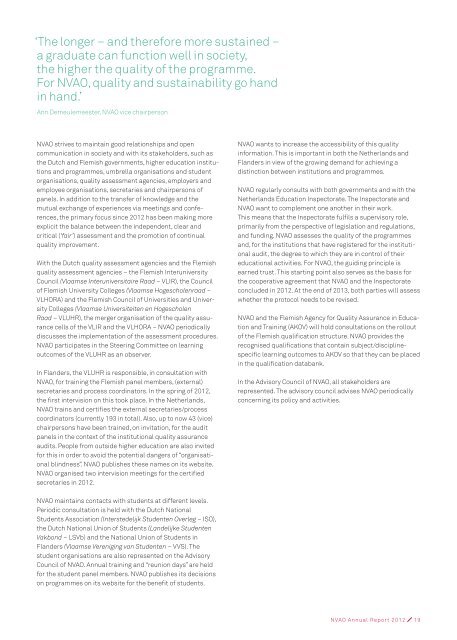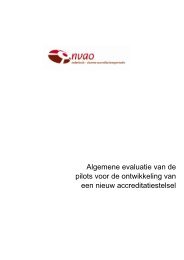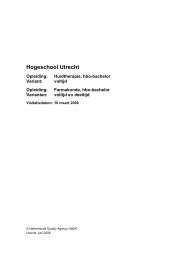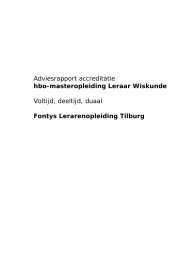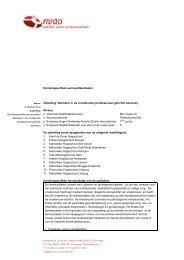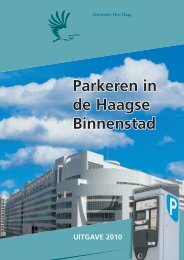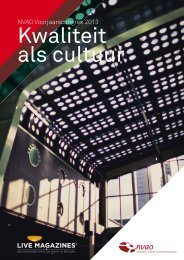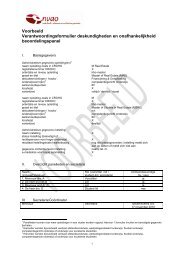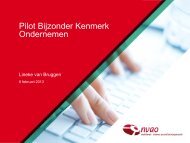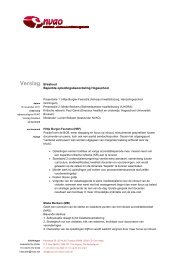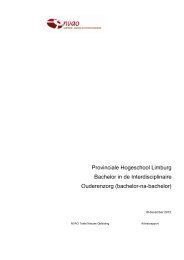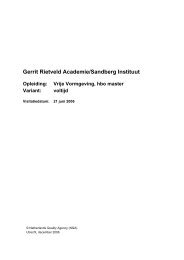Annual Report 2012 Summary - NVAO
Annual Report 2012 Summary - NVAO
Annual Report 2012 Summary - NVAO
You also want an ePaper? Increase the reach of your titles
YUMPU automatically turns print PDFs into web optimized ePapers that Google loves.
‘The longer – and therefore more sustained –a graduate can function well in society,the higher the quality of the programme.For <strong>NVAO</strong>, quality and sustainability go handin hand.’Ann Demeulemeester, <strong>NVAO</strong> vice chairperson<strong>NVAO</strong> strives to maintain good relationships and opencommunication in society and with its stakeholders, such asthe Dutch and Flemish governments, higher education institutionsand programmes, umbrella organisations and studentorganisations, quality assessment agencies, employers andemployee organisations, secretaries and chairpersons ofpanels. In addition to the transfer of knowledge and themutual exchange of experiences via meetings and conferences,the primary focus since <strong>2012</strong> has been making moreexplicit the balance between the independent, clear andcritical (‘fair’) assessment and the promotion of continualquality improvement.With the Dutch quality assessment agencies and the Flemishquality assessment agencies – the Flemish InteruniversityCouncil (Vlaamse Interuniversitaire Raad – VLIR), the Councilof Flemish University Colleges (Vlaamse Hogescholenraad –VLHORA) and the Flemish Council of Universities and UniversityColleges (Vlaamse Universiteiten en HogescholenRaad – VLUHR), the merger organisation of the quality assurancecells of the VLIR and the VLHORA – <strong>NVAO</strong> periodicallydiscusses the implementation of the assessment procedures.<strong>NVAO</strong> participates in the Steering Committee on learningoutcomes of the VLUHR as an observer.In Flanders, the VLUHR is responsible, in consultation with<strong>NVAO</strong>, for training the Flemish panel members, (external)secretaries and process coordinators. In the spring of <strong>2012</strong>,the first intervision on this took place. In the Netherlands,<strong>NVAO</strong> trains and certifies the external secretaries/processcoordinators (currently 193 in total). Also, up to now 43 (vice)chairpersons have been trained, on invitation, for the auditpanels in the context of the institutional quality assuranceaudits. People from outside higher education are also invitedfor this in order to avoid the potential dangers of “organisationalblindness”. <strong>NVAO</strong> publishes these names on its website.<strong>NVAO</strong> organised two intervision meetings for the certifiedsecretaries in <strong>2012</strong>.<strong>NVAO</strong> wants to increase the accessibility of this qualityinformation. This is important in both the Netherlands andFlanders in view of the growing demand for achieving adistinction between institutions and programmes.<strong>NVAO</strong> regularly consults with both governments and with theNetherlands Education Inspectorate. The Inspectorate and<strong>NVAO</strong> want to complement one another in their work.This means that the Inspectorate fulfils a supervisory role,primarily from the perspective of legislation and regulations,and funding. <strong>NVAO</strong> assesses the quality of the programmesand, for the institutions that have registered for the institutionalaudit, the degree to which they are in control of theireducational activities. For <strong>NVAO</strong>, the guiding principle isearned trust. This starting point also serves as the basis forthe cooperative agreement that <strong>NVAO</strong> and the Inspectorateconcluded in <strong>2012</strong>. At the end of 2013, both parties will assesswhether the protocol needs to be revised.<strong>NVAO</strong> and the Flemish Agency for Quality Assurance in Educationand Training (AKOV) will hold consultations on the rolloutof the Flemish qualification structure. <strong>NVAO</strong> provides therecognised qualifications that contain subject/disciplinespecificlearning outcomes to AKOV so that they can be placedin the qualification databank.In the Advisory Council of <strong>NVAO</strong>, all stakeholders arerepresented. The advisory council advises <strong>NVAO</strong> periodicallyconcerning its policy and activities.<strong>NVAO</strong> maintains contacts with students at different levels.Periodic consultation is held with the Dutch NationalStudents Association (Interstedelijk Studenten Overleg – ISO),the Dutch National Union of Students (Landelijke StudentenVakbond – LSVb) and the National Union of Students inFlanders (Vlaamse Vereniging van Studenten – VVS). Thestudent organisations are also represented on the AdvisoryCouncil of <strong>NVAO</strong>. <strong>Annual</strong> training and “reunion days” are heldfor the student panel members. <strong>NVAO</strong> publishes its decisionson programmes on its website for the benefit of students.<strong>NVAO</strong> <strong>Annual</strong> <strong>Report</strong> <strong>2012</strong> 19


